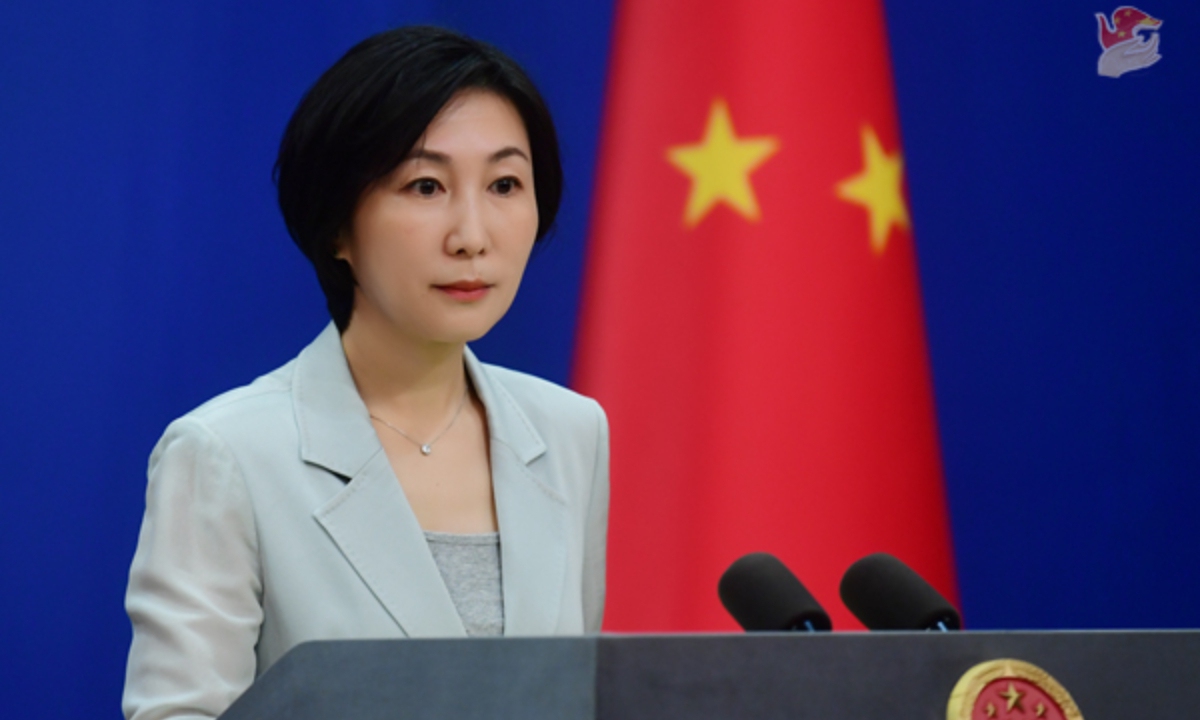(Source:Global Times,2025-07-09)

Foreign Ministry Spokesperson Mao Ning Photo: Ministry of Foreign Affairs
The US is overstretching the concept of national security and unjustly denying institutions and citizens of certain countries their legitimate right to purchase land and property, a Chinese Foreign Ministry (FM) spokesperson said on Wednesday, denouncing the move as "a typical act of discrimination."
Such move violates the principle of market economy and international trade rules, and will eventually hurt the US's own interests, FM spokesperson Mao Ning told a press briefing. "We urge the US to immediately stop politicizing trade and investment issues," Mao added.
Mao's comments came in response to a new US government plan to restrict Chinese and other foreign purchases of American farmland, citing national security concerns, as reported by multiple US media outlets including the New York Times on Tuesday (local time).
In a seven-point national security plan, the US Department of Agriculture (USDA) said it would enhance public disclosures of foreign ownership of farmland, enact steeper penalties for false filings and work with Congress and states to ban purchases from foreign adversaries, the New York Times reported.
Chinese experts called the move an escalation and expansion of US restrictions, moving from state to national levels, as the USDA's announcement claims the plan aims to "work in further unison with governors, state legislators, and other partners to fully integrate agriculture into the broader national security enterprise over the coming months and years."
Twenty-six US states currently prohibit or limit non-Americans from purchasing or investing in agricultural land within their boundaries, according to the New York Times report. While there is no federal law barring the practice, a 1978 law requires foreign owners to report their holdings, the report said.
China's Embassy in Washington also refuted the USDA's claims on Tuesday. Embassy spokesperson Liu Pengyu said that the US was "overstretching" the concept of national security, the South China Morning Post reported on Wednesday.
"Over the years, Chinese companies' investment in the United States has made important contributions to local jobs and growth," said Liu, adding that "Politicizing economic and trade investment issues violates the principles of the market economy and international trade norms, only to undercut international confidence in the US market environment."
The US policy is clearly discriminatory, as its restrictions explicitly target specific countries, particularly China, said Song Guoyou, a deputy director of the Center for American Studies at Fudan University. He also contends that the so-called "national security" rationale is baseless.
"In reality, Chinese share of US farmland is minimal, far too small to pose any substantial threat to American national security," Song told the Global Times on Wednesday.
According to a 2023 Annual Report released by the USDA, Chinese individuals or businesses held 277,336 acres (112,234 hectares) of US land, which is slightly less than 1 percent of foreign-held acres, and "there were no filings directly by the government of China."
"This shows that the US government's actions are not driven by economic or market logic but are instead a form of politicized manipulation," Song emphasized, adding that the plan is based on the anti-China bias of certain politicians in the current US administration, with even a lack of agreement within both parties.
Arizona Governor Katie Hobbs, a Democrat, vetoed a bill aimed at preventing China from buying up land next to strategic assets, such as military bases, according to media reports. Hobbs said the bill, was "ineffective at counter-espionage" and did not "directly protect" American military assets in the state, the Fox News reported.
These restrictions are not designed to serve the interests of most Americans, so it's no surprise that they've sparked bipartisan disagreement, Song noted. "Such actions not only fail to deliver the so-called national security benefits but may also harm the US economy, particularly in sectors like agriculture that rely on investment and open markets," he warned.
As bilateral economic and trade relations steadily progress, some US politicians repeatedly hype the "China threat," reflecting deep-seated political bias and irrational security anxiety, Li Yong, a senior research fellow at the China Association of International Trade, told the Global Times on Wednesday. He cautioned that such rhetoric seriously obstructs normal economic cooperation and poses a long-term obstacle to mutual trust.
Song emphasized that China-US economic and trade cooperation is mutually beneficial and win-win in nature, urging the US government to abandon this escalating confrontational stance and seek mutually stable economic development through cooperation.



